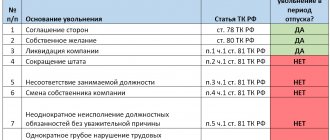In connection with current realities, the topic of violation of employee rights and illegal dismissals is increasingly being taken into account. It is worth first understanding the very concept of illegal dismissal.
Unlawful dismissal of an employee will be the termination of an employment contract by the employer without legal grounds. These types of dismissal include grounds that are not provided for by the Labor Code of the Russian Federation or based on false arguments of the employer, as well as dismissal with non-compliance with the procedure established by law.
You can legally terminate a contract on the following grounds:
- by agreement of the parties;
- upon expiration of the validity period (for concluded contracts for a certain period);
- at the employee’s own request;
- at the initiative of the employer;
- in connection with a transfer to another job;
- due to circumstances that do not depend on the will of the parties to the contract.
But the Labor Code of the Russian Federation does not have the concept of “illegal dismissal” as such, although it may exist if the court found the dismissal to have been committed in violation of legal norms.
How to understand that dismissal is illegal
- The employer dismissed the employee for violation of discipline without first imposing milder disciplinary sanctions, which could be a warning or reprimand.
- A dismissed employee is related to preferential categories of citizens. Such employees can be dismissed only on the basis of liquidation of the company or due to the expiration of a fixed-term employment contract with the absence of other vacancies for this citizen.
- The employer forced the employee to write a letter of resignation through deceptive methods or other measures when the employee did not have the desire to resign on his own.
- The reason for dismissal is not described in the Labor Code of the Russian Federation or other legislative acts;
- The employee was dismissed while he was on sick leave (however, such dismissal is legal during the liquidation of the company).
- The employer did not comply with the legal requirements for the dismissal procedure.
What to do in case of illegal dismissal from work
The only possible solution to this situation is to go to court. The legislation provides specific periods from the date of illegal dismissal during which an employee can go to court.
This must be done in the first month from the moment of receiving a copy of the order or work record book or refusal to receive them. If you go to court after a month, the authority will refuse to consider the case. An exception in such situations may be cases of illness during this period of time.
You need to contact the district court. The employee is exempt from paying state duty. It is worth noting that neither the labor inspectorate (if you are not a member of a trade union) nor the prosecutor’s office will be able to consider the employee’s case. An administrative or criminal case can be initiated against an employer only on the basis of a court decision that has declared the company’s actions illegal.
Algorithm of employee actions
Before dismissing an employee under Article 81 (at the initiative of the employer), the manager may invite the employee to write a statement of his own free will. Proving the illegality of dismissal if such a statement is written will be problematic, and labor disputes opened in such cases are usually resolved in favor of the employer.
What to do in such cases? The employee must wait for the dismissal order to be issued and an entry to be made in the work book. After this, he has the right to familiarize himself with the order and take measures to protect his rights. The statute of limitations for dismissal for absenteeism or other disciplinary violation is 1 month.
Legal advice! Before filing a claim in court, you must submit a written claim to the head of the organization. The document must be drawn up in 2 copies so that, if necessary, it can be attached to the statement of claim.
How to act in case of illegal dismissal in order to receive a settlement and where to go for reinstatement?
State Labor Inspectorate
Since the State Labor Inspectorate supervises compliance with labor legislation, contacting this authority has the following advantages:
- Consideration of the submitted complaint within 30 days.
- Small costs for appeal.
- No additional organizational or labor costs.
- The possibility of bringing the employer to administrative liability for violation of labor legislation under Art. 5.27 of the Code of Administrative Offences.
At the same time, there are a number of negative points that should be taken into account before sending a complaint to the labor inspectorate:
- Lack of possibility of a comprehensive consideration of the case, which entails a low percentage of satisfaction of complaints. In this regard, filing a claim with the State Labor Institution should be limited to situations where violations on the part of the employer are formal and obvious.
- There have been recorded cases of failure to comply with the established deadlines for consideration of complaints, as a result of which the period for appealing dismissal expires.
Procedure for contacting the State Labor Inspectorate:
- Find out the address of the territorial inspection department.
- File a statement and indicate a violation of rights.
- Attach to the application documents that confirm the stated arguments.
- Take the application in person or send it by registered mail.
Rules for filing a complaint
A correctly drawn up application must contain the following information:
- name of the territorial representative office of the labor inspectorate;
- Full name and address of the applicant;
- indication of violation of labor rights, arguments and complaints;
- date and signature.
When writing a complaint, you should avoid speculation and give up a subjective assessment of what is happening.
After considering the complaint, the inspector will conduct an inspection of violations of labor legislation, based on the results of which a decision may be made on the need to reinstate the employee, compensate for losses, or hold the manager accountable.
The decision of the State Tax Inspectorate can be appealed within 3 months if it is not made in favor of the employee.
Prosecutor's office
The powers of the prosecutor's office and the State Tax Inspectorate are largely similar. This government body conducts inspections, the results of which can bring the employer to administrative responsibility or oblige the employer to eliminate violations. If inconsistencies in the dismissal procedure are identified, the prosecutor will file a protest with the employer - a demand to cancel the illegal decision.
In addition, using Art. 45 of the Code of Civil Procedure of the Russian Federation, the prosecutor may file a lawsuit demanding the reinstatement of an illegally dismissed employee.
A complaint about illegal dismissal should be sent to the prosecutor's office at the place of registration of the legal entity with the obligatory indication of:
- name, legal address and telephone number of the employer;
- Full name and contact details of the applicant;
- circumstances that led to violation of labor law;
- requirements clearly formulated in the petition part.
Applications may also be added that substantiate the applicant’s position or prove wrongdoing on the part of the employer.
Sample to the prosecutor's office
The prosecutor's office conducts an investigation within one month. The employer may be afraid of the prosecutor's inspection and such an appeal will help to be reinstated at work. However, the most effective way to resolve the issue is to file a lawsuit.
Court
The statement of claim must be filed with the district court at the place of registration of the employer. The main advantages of this treatment include:
- Efficiency. The plaintiff’s claims can be considered in court in full, with the involvement of witnesses and clarification of all the nuances of the relationship between the employee and the employer.
- Possibility of collecting compensation for causing moral damage.
- Availability. According to Art. 393 of the Labor Code of the Russian Federation, an individual is exempt from paying state duty if he files a claim to restore his labor rights.
The standard time frame for declaring a dismissal illegal through a court is 1 month. However, as judicial practice shows, proceedings drag on for a longer period.
Preparation of documents
Before sending a statement of claim to the court, you should prepare a package of documents:
- An employment contract defining working conditions and the real level of wages.
- Work book with records of hiring and dismissal.
- Copies of hiring and dismissal orders.
- Certificate indicating the position and qualifications, characteristics of the employee.
- Acts on bringing to responsibility at the place of work.
- Documents that confirm that the employer’s arguments are falsified.
A claim against the employer, which was filed immediately after the illegal dismissal, is also sent to the court.
The employer is obliged to provide documents upon your request within 5 days. In case of evasion of this requirement, the fact of violation is recorded in the claim, after which the necessary certificates are requested by the court.
To appeal the consequences of illegal dismissal, you should prepare a claim containing the following data:
- name of the court;
- Full name, address and contact telephone number of the defendant;
- name, legal address and telephone number of the employer;
- the circumstances of hiring and dismissal, justification of the reason why the plaintiff considers the dismissal illegal;
- the plaintiff’s demands – reinstatement, compensation for damage and moral harm, etc.;
- list of attached documents;
- date and signature.
Sample to court
During the trial, the plaintiff has the right to abandon the claim, change its basis or requirements, and enter into a settlement agreement with the employer.
Based on the results of the judicial review, one of the following decisions may be made:
- reinstatement of the employee at work;
- changing the wording of the reason for dismissal;
- compensation for losses in the amount of the average monthly salary;
- compensation for moral damage.
Unions
According to Art. 374 of the Labor Code of the Russian Federation, you cannot dismiss a trade union member without the consent of the trade union body. If the head of the organization violated this legal requirement, you can appeal his actions by filing a complaint with the trade union. In such cases, the trade union organization applies to the State Labor Inspectorate, which obliges the employer to reinstate the employee and compensate for losses.
If the court found the dismissal illegal
If the court recognizes the fact of illegal dismissal from work, the body may oblige the employer:
- Reinstate the employee in his original position.
- Pay the employee the average monthly salary for the entire period of forced absence due to illegal dismissal from the period of dismissal until the day of reinstatement or a court decision.
- Correct the entry in the work book to indicate “dismissal of one’s own free will” if the employee does not plan to continue working for this employer.
- Pay compensation for moral damage.
- Pay the employee court costs, as well as the costs of legal services of a representative in court.
The employee has the right to move and work at another job even while the case is being considered by the court. In this case, wages for forced absence due to illegal dismissal will still be recovered from the employer. That is, it is not at all necessary to be reinstated at your previous place of work. And an inappropriate entry in the work book can be legally replaced with “dismissal at will.”
Dismissal due to staff reduction
The basis for such dismissal is clause 2, part 1, art. 81 Labor Code of the Russian Federation.
Employees are notified of upcoming dismissal due to reduction 2 months before the expected date of termination of the employment contract (Article 180 of the Labor Code of the Russian Federation). For seasonal workers, this period is reduced to 7 calendar days (Article 296 of the Labor Code of the Russian Federation).
From the moment of notification and until the day of termination of the employment relationship, the employer is obliged to offer available vacancies to laid-off employees:
- relevant qualifications of workers;
- lower positions;
- lower paid job.
Dismissed employees have repeatedly gone to court, believing that they were laid off in violation of the established procedure. Some of the cases were considered by the Supreme Court of the Russian Federation, which made conclusions (clauses 3, 4 of the Review of Practice):
| Solution | Determination of the Judicial Collegium for Civil Cases of the Armed Forces of the Russian Federation dated September 14, 2020 No. 53-KG20-4-K8 | Determination of the Judicial Collegium for Civil Cases of the Armed Forces of the Russian Federation dated January 20, 2020 No. 5-KG19-217 |
| The crux of the matter | The employee does not recognize his layoff as legal, because vacant positions were offered to other laid-off employees, but not to him | The employee does not recognize his layoff as legal because he was not offered a vacancy in a branch of the organization in the same area |
| Employer's position | The employer did not offer vacant positions because other laid-off employees who filled them were first notified about them | The employer had no vacancies in the branch where the employee was registered, so layoffs followed |
| Position of the RF Armed Forces | Art. 2 and art. 3 of the Labor Code of the Russian Federation establishes equality of rights and opportunities for workers and prohibits discrimination in the world of work. According to Art. 180 of the Labor Code of the Russian Federation, the employer is obliged to offer the laid-off employee vacancies available from the moment of notification of the upcoming layoff until the day of dismissal. Therefore, dismissal due to reduction is allowed only if the employee refuses the offered vacancies | According to paragraph 2 of Art. 55 of the Civil Code of the Russian Federation, a branch is a separate division of a legal entity located outside its location. Part 3 art. 81 of the Labor Code of the Russian Federation obliges the employer to offer vacancies to laid-off employees in a given locality, and, if there are appropriate conditions in a collective or labor contract, agreements, in other localities (outside the administrative-territorial boundaries of the relevant locality). The employer was obliged to offer the employee vacant positions in all departments of the city |
| Conclusion | Management does not have the right to decide who is offered vacancies and who is not. Vacant positions must be offered to every redundant employee. It is necessary to select an employee for a position if there are several applicants, taking into account the advantage in leaving the job, as well as the chronology of obtaining consent to fill vacant positions | Management is obliged to offer the redundant employee available positions in all branches and separate divisions in the area in which the employee worked |
What does an organization face for illegally dismissing an employee?
For illegal dismissal, administrative and, in some cases, criminal penalties may be applied to the employer.
- Administrative liability is expressed in the form of payment to the state of a fine in the amount of 1,000 to 5,000 rubles from the guilty official or a fine from a legal entity in the amount of 30,000 to 50,000 rubles, as well as a fine from an individual entrepreneur in the amount of 1,000 to 5,000 rubles. 5,000 rubles.
- Criminal liability occurs in cases of illegal dismissal of privileged categories of citizens, for example, single mothers who are raising a child under 3 years of age. In this case, Art. 145 of the Criminal Code of the Russian Federation and punishment in the form of a fine in the amount of up to 200,000 rubles, or in the amount of wages or other income of the convicted person for a period of up to 18 months, or by compulsory work for a period of up to three hundred and sixty hours.
The state labor inspectorate is responsible for bringing the employer to administrative liability, which must be contacted after the court makes a decision on actual illegal dismissal.
If you want to challenge illegal dismissal from work, then you first need to make sure that the employer violated the norms of the Labor Code of the Russian Federation, sue the employer with a subsequent ruling in your favor and initiate enforcement proceedings. If necessary, you can always get advice or legal assistance by contacting RosCo specialists.
Procedure for reinstatement at work
If the court decides that the dismissal was carried out illegally, a writ of execution is drawn up. According to this document, the head of the legal entity is obliged to restore the employee to his previous position no later than one working day from the moment the writ of execution is received by the bailiffs.
The HR department draws up an order to cancel the order to dismiss the employee, and the employee is familiarized with it. There is no order for reinstatement. Then the employee is informed about the day on which he can begin performing his duties again, and is asked to provide a work book. In it, the last entry is considered invalid and the details of the court decision are indicated. If an employee reinstated wishes to receive a duplicate of the work book with the restoration of all entries made in it, except for the last one about illegal dismissal, the employer is obliged to do this. In a similar way, corrections are made to the employee’s personal card, and adjustments are also made to the time sheet.
It is important that an illegally dismissed employee must be reinstated to his previous position, maintaining the same working conditions, even if the employer has already hired a new person for this position (he is fired) or this position has been reduced (it is restored).
In this way, the employee must be reinstated in his position. However, in practice, not all employers who lose in court want to rehire a legally competent employee into their staff. If the court evades execution of a court decision, the court may additionally fine the enterprise, and if it happens again, make a decision to pay an even larger fine.









